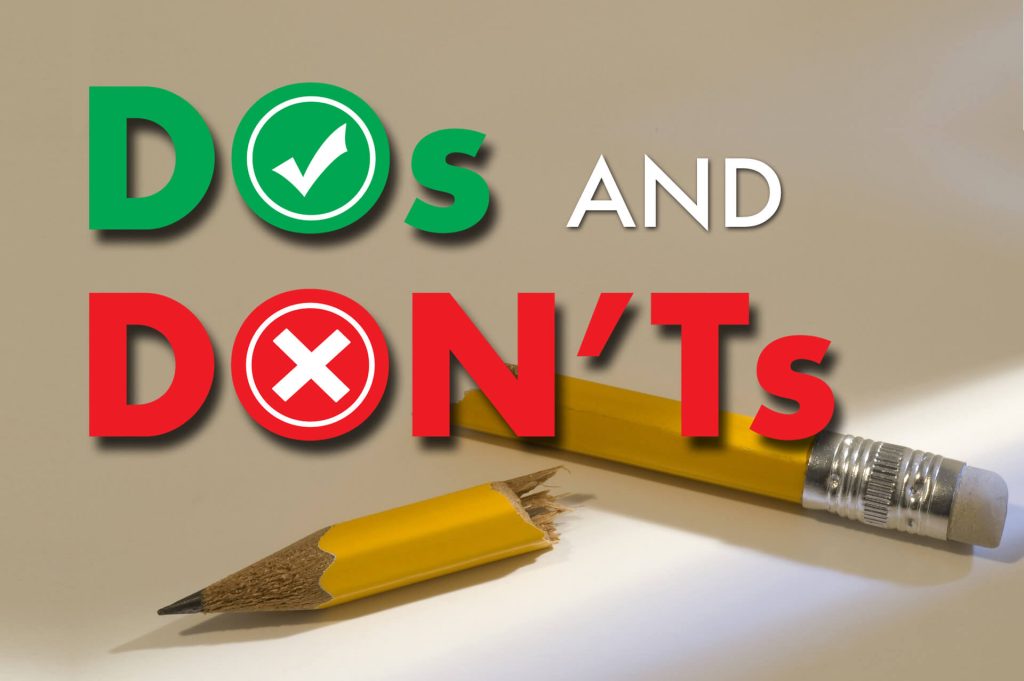Let’s not get off on the wrong foot
You’ve decided to work with a copywriter — great decision!
But then you go and spoil it all by saying something that makes us raise an eyebrow. We find ourselves doubting that this will be the good working relationship we were hoping for and we’ll tell you it’s a no.
- I have no availability for the next 20 years
- Sorry, I’ve just remembered I have no fingers
- I charge £10,000 a word
- I’m not actually a copywriter
- My dog just ate my laptop
- I’m going to outer Mongolia and I don’t know when I’ll be back.
All code for thanks, but no thanks.
But if you want the truth — and you can handle the truth — about what you shouldn’t say to a copywriter and why, then keep reading.
23 things you should never say to a freelance copywriter — and why
These are our red flags.
The things that make us not want to work with you.


1. Our previous copywriters have all been terrible
What? Really? All of them?
When we hear this, we often find it hard to believe. And we’ll probably surmise that the common denominator in all those failed working relationships was you.
Before you hire another copywriter, think about what went wrong before. Whose fault was it really? Were there things you could have done better?
- Could you have been clearer about what you wanted?
- Did you need someone more experienced (and expensive) than the person you hired?
- Is it possible your expectations were unrealistic?
2. Sorry, we want a native English speaker
Writers who have English as a second language hear this one a lot.
The assumption seems to be that someone who isn’t a native English speaker can’t possibly have the language skills to write your copy. But this simply isn’t true. There are some fantastic non-native copywriters out there who could be a perfect fit for your project.
Having English as a first language doesn’t automatically make someone a better copywriter. It’s all in the quality of their writing and the results they’re achieving for their clients.
If you’re thinking of a hiring a copywriter, you should look at their work and their testimonials first. And let those be the things that guide your decision.
3. Have you written about <subject> before?
You’ve never worked with a copywriter before and you don’t understand the copywriting process. But, as the prospective client, you feel obliged to ask the copywriter something to see if they’re qualified for the job. So you ask if they have experience of writing on your specific subject or for your industry.
But if the copywriter says yes, that doesn’t necessarily mean they did a good job. And if they say no, that doesn’t mean they won’t do an amazing job.
Do you really need a specialist?
If you work in an industry that’s very specialised, you might need a specialist copywriter.
For example, this might be the case if your industry is heavily regulated, your subject is complex or your customers have a high level of technical knowledge.
But, ultimately, your copywriter’s expertise is in communicating what you do to the people you want to sell it to. And, in most cases, they don’t need subject/industry experience to be able to do that.
You can read more about this in my article: How to choose a copywriter >>
4. You must be able to guarantee these results
You’ve seen the results a copywriter has achieved for another client and you want them to guarantee the same result for you. But no copywriter will be able to make a guarantee like that, because it simply isn’t feasible.
First, you’re looking at two different projects that might not be comparable.
And second, copy doesn’t work in isolation. You could have the best copy in the world, but there’s no guarantee it will work if you have a bad product, a problematic website or bad reviews from other customers.
5. I can get it much cheaper on Fiverr
We know. Everyone is cheaper on Fiverr — and they’re cheaper for a reason.
The cheap copywriters on Fiverr are in a race to the bottom, working on high volumes and fast turnarounds. But this isn’t the way to write good copy that gets results. Good copywriters will never price-match with the copywriters on Fiverr because the quality of the work is nowhere near comparable.
So if you want Fiverr prices, the only place you’ll get them is Fiverr.
6. Can you write us a 1,000-word test piece?
You mean a free 1,000-word test piece?
First, do you realise how long that will take? And second, what do you plan to do with it?
Does it really take 1,000 words to decide if we’re a good enough writer for you? Are you going to pour over every word and scrutinise every detail? Or is it because you need something writing and you don’t want to pay for it?
Asking a freelancer to work for free is unfair and usually unnecessary. If you want to see samples of our work, you can look at our portfolios — or ask us for them.
Good copywriters will never agree to work for free, because our time is too valuable. And we’re not going to spend it creating work for free when we have clients who are prepared to pay us.
7. Can you send a copy of your CV?
If you ask us this, the answer will be no.
We’re not employees, we’re business owners, so we don’t have CVs.
All the information you should need is on our websites and LinkedIn profiles.
8. Can I pay by the word? I don’t need many
Saying this to most copywriters will give us major cause for concern.
The majority of us don’t price by the word, because it doesn’t make sense.
According to the 2023 ProCopywriters survey:
- 59% charge a project fee
- 34% charge a daily or hourly rate
- Only 5% charge per word.
Why most copywriters don’t charge by the word
It’s a misconception that all a copywriter has to do is sit down and type some words. I mean, we could do that, but without a lot of research and idea development, those words won’t mean a lot or achieve the desired results.
It’s the research and idea development that takes up most of a copywriter’s time. And that’s what you’re really paying for.
Take Just Do It, for example. Nike’s famous three-word slogan is known all over the world. Yes, it’s just three little words, but think of all the research, ideas, development, refinement and time it must have taken to come up with those three little words.
Why asking for fewer words won’t save you money
First, it’s not for you to decide how many words you need. That will depend on your ideal customers and how much information they need before they’ll feel confident to buy from you.
Second, writing fewer words will actually take us longer. Mark Twain expressed this best when he said:“I didn’t have time to write a short letter, so I wrote a long one instead.”
Distilling your research and ideas into a concise message takes a lot of time and skill. Most copywriters will charge you a premium for that.
9. If the price is right, we’ll send lots more work
Well, that’s a great deal… for you.
But for the copywriter it means a lot more work for a lot less money. And that’s much less appealing.
10. What’s your best rate?
For most copywriters, our best rate will be our normal rate.
You see, when we set our rates, we don’t just pluck them out of thin air. They’re based on the expertise we offer, the value we bring and returns our work is likely to generate for you.
Trying to start a price negotiation devalues all of that. And it changes the conversation from talking about an investment to an expense — which is not what copywriting is.
11. Why can’t I just pay it all at the end?
Most copywriters will ask you to pay money upfront. Depending on the price of the project, this could be the full amount or a deposit. This is standard practice and there are good reasons for it.
There’s an element of risk in every creative working relationship. Paying money upfront means you’re taking a share of that risk, which is a much fairer way to work.
Some projects take a long time, so getting some or all of the money upfront keeps our cashflow flowing.
12. We have no budget, but it will be great exposure
Okay, so what counts as ‘great’ exposure to you and who’s actually going to see it?
Is it going to be featured in lots of high places and put in front of lots of influential people? Will those people then be clamouring to work with us and pay us lots of money? Because that’s how you make it sound. But if it’s such a high profile project, it’s hard to believe nobody is getting paid for it.
There’s a standard answer to this one.
Exposure doesn’t pay our bills.
13. When we make money, you make money
You have what you think is an amazing idea and you know it’s going to be HUGE. And you’re promising that we stand to make a lot of money, too… if we write you a free pitch or sales letter.
The question is, if you really believe in it and you’re confident it’s going to succeed, why aren’t you investing your money in it and why can’t you pay us?
14. I need it yesterday
We get it. You’re in a hurry. You need us to drop everything and focus solely on your project.
To push our other client work down the queue. To leave our lunch uneaten, our dogs unwalked and, on some occasions, our beds unslept in.
The problem is, we can’t accomplish what would normally be three days’ work in 24 hours without compromising our standards and quality. And for copywriters who care about quality and results, this isn’t an acceptable way to work.
We know, these things happen and sometimes it’s unavoidable. But if you’re always working against the clock, you’ll never be getting the full benefit your copywriter has to offer.
15. We need it before Christmas
We presume you say this because you want to leave for your Christmas break knowing everything is done for when you get back. Because nothing generally happens between Christmas and New Year.
So your copywriter will be working at breakneck speed to meet your pre-Christmas deadline, only for the copy to sit in your email inbox for a whole week, untouched.
Instead, why not give us the time we need and set the deadline for when you return to the office after the break?
16. Can’t you just copy our competitor’s copy?
The answer to this will always be a firm no. Because copying a competitor’s work is plagiarism and it could get you into serious trouble.
Asking this question will suggest to your copywriter that you can’t be bothered. This is never a good start, because every copywriting project needs client input. To make your copy a success, we need to know about your brand, your value proposition and your ideal customers.
17. It should only take you 10 minutes
It doesn’t matter what you’re asking for. When you say this, it tells us you know nothing about copywriting and you’re angling for something cheap or free.
You should know that we’ll always be the judge of what’s involved, how long it will take and how much it will cost.
18. The SEO company has done the keyword research
When you say this, the implication is that the SEO keyword research is done and dusted, so we don’t need to charge for it. But you should know this is rarely the reality.
SEO companies don’t tend to approach keyword research in the same way a copywriter does. They’ll typically provide hundreds or thousands of potential keywords with no discernment or filtering. For your copywriter, this is no more helpful than starting the process from scratch.
So if you say this to your copywriter, you should expect us to ask to see the keyword research before we quote.
19. You can use AI to write it then just tidy it up
If you even suggest this, your copywriter is liable to either self-combust or triple their prices on the spot!
AI still has so many limitations when it comes to copywriting that this isn’t even a feasible proposition.
And if you don’t believe me, you can read about them here:
17 Reasons NOT to rely on AI writers for your business copywriting >>
20. I’d write it myself if I had the time
If you say this, you probably have a very specific idea of how your copy should be written. And unless we can climb inside your head, your copywriter will never match that.
It’s a surefire sign that our working relationship will be difficult. You’ll question everything and you’ll end up disappointed, which won’t be good for either of us.
21. To save time, I’ve done the research for you
You may have done some research, but we can pretty much guarantee you haven’t done all the research we need or with the same level of detail.
You may have indiscriminately copied and pasted information from multiple sources or included lots of links, but without any strategy or plan. Sometimes we don’t know where the information came from or whether it’s credible. And in most cases this doesn’t save us time or make our jobs any easier.
22. Our ideal customer is everyone
No company’s ideal customer is everyone.
It’s highly unlikely that any product or service will have universal appeal. And checking they have a pulse is not the best way to qualify a lead.
Maybe if you start by thinking about the kinds of people you don’t want to work with, that will give you a better idea of who your ideal customers are.
The more specific you can be about who your ideal customers are, the easier it will be for your copywriter to sell to them.
23. I don’t know what I want, but I’ll know when I see it
When you say this, it’s a huge red flag. Because if you don’t know what you want, how is your copywriter supposed to know?
A project without a clear and coherent brief will always be a nightmare, with endless rounds of changes and amendments. Frustration for both of us and spiralling costs for you.
About the author
I’m Jenny Lucas, a freelance copywriter and content writer based in Leicester, UK.
In my 12 years as a freelance copywriter, I’ve heard all of the above multiple times and the ensuing working relationships have always been a disaster.
If you’re serious about copywriting for your business and you need a trusted partner to help you, you can find out more about me and what I do on my website.


You might also like…






